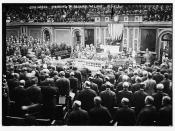The Children's Online Privacy and Protection Act of 1998 On May 2, 2000 Representative Jay Inslee of Washington State told his colleagues on the floor of the House why he supported the Children's Online Privacy Protection Act of 1998. The Congressman cited a March of 1998 study of children's websites conducted by the Federal Trade Commission. The study found that while almost ninety percent collected data from the user; only one-quarter posted privacy policies(Inslee, par.5) Furthermore, only three websites of the two hundred-twelve sites surveyed required parental consent for the collection or disclosure of children's information. The legislation, as he states, "prohibits unfair and deceptive acts in connection with the collection and use of personal information from and about children on the internet"�(Inslee,par.3). His remarks came one week after the Federal Trade Commission enacted the rules and regulations called for by the Children's Online Privacy and Protection Act, and two years after the same study was presented to Congress by the Federal Trade Commission (Inslee,par.5).
This paper will examine the Children's Online Privacy and Protection Act of 1998. It will give background on where and how the legislation got started, and by whom. I will summarize the body of the statute and give a functional view of its goals. I will illustrate the statutes journey from its passage in Congress, its implementation by the Federal Trade Commission, and to its affect on the World Wide Web. I will try to explain where it is going and some of the issues that have and will arise because of its passage. Finally I will explain why COPPA is significant, and why it is a groundbreaking piece of legislation.
The Children's Online Privacy and Protection Act or COPPA began in the spring of 1998. After several advocacy groups published reports regarding the...


